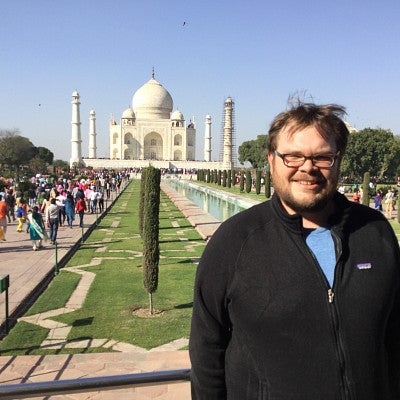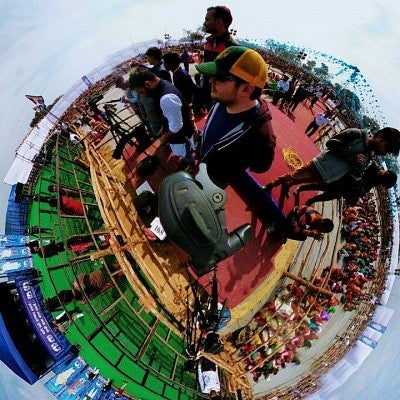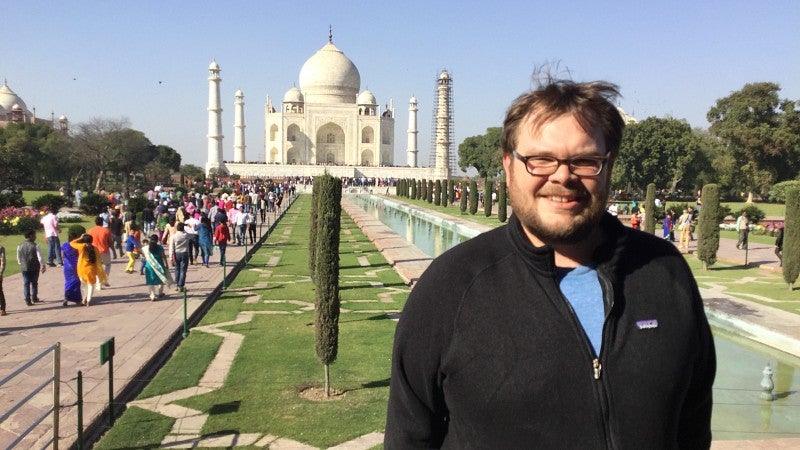Story by Becky Hoag
Photos courtesy of Patrick Jones
What do ballot boxes and voting machines have to do with media?
This question makes UO School of Journalism and Communication (SOJC) Media Studies PhD candidate Patrick Jones laugh. It’s something he’s been asked often since declaring his dissertation topic.
“The voting machine is a form of media technology, because your vote is a form of communication — not just in terms of communicating your choice of candidate, but also the data your vote turns into for political campaigners,” Jones said. “There’s a lot of controversy and partisan debate around voting machines. It’s much more than just people’s political preferences.”
Jones’s research examines the effects of balloting technology on voter confidence and the stability of a democracy. He theorizes that, for a democracy to work, people must have faith that their votes will be counted.
Jones began developing an interest in political communication when he was abroad doing research for his master’s in international studies at the University of Oregon. He traveled to the Middle East in 2010 to study and do ethnographic work.

“I spent six months doing field work in Lebanon,” said Jones, who is fluent in Arabic. “It was right before the Egyptian revolution, the Syrian civil war and the Arab Spring. In Lebanon, I first recognized the way digital media and technology was used to express political dissent.”
The political situation opened up a whole new world of potential research interests. Jones ended up researching the Lebanese social services and how they were portrayed in the Lebanese press.
He interviewed people, formally and informally, and collected data by sifting through archives. His goal was to put together as many pieces as possible to form an accurate account of what was happening in his research area. It was his first time mixing technology and media studies, and he liked it.
When Jones applied for the SOJC’s Media Studies PhD program, he faced a big decision: how to narrow down all his passions and interests into a single dissertation topic.
“Originally, I was going to study three different technologies influenced by three different events: satellite television and the Egyptian Revolution, Twitter and the Umbrella movement in Hong Kong, and ballot boxes and Indian elections.”
Jones settled on the Indian ballot boxes because his faculty adviser, SOJC associate professor Bish Sen, had a grandfather who organized the first formal Indian election. He also found this media and technological niche had been largely neglected by researchers.
“As I started doing research, I got more interested in the ballot box in general because nobody ever writes about it,” Jones said.
The topic also gave him a chance to compare India’s voting style to the election system in the United States. Then his research became more personal.

The next step was to travel to Delhi for some field research. Jones and Sen secured SOJC grants and contacts before Jones embarked on the trip.
“It was a really fun experience wandering all over Delhi and talking to journalists, NGO people, political activists and political officials about electronic voting machines in India,” Jones said. “I was able to watch stories spiral out into larger discussions about Indian political culture.”
He attended political rallies and got to observe firsthand the 2017 Indian state elections. When he compared these experiences with U.S. elections, he found that Indian elections are much more organized.
“Voting day is a national holiday in India,” Jones said. “The polling booths are spaced out, and there are very rarely any lines. And celebrations, parties and family and community stuff happens after. It was so different from here, where people stand in lines after work and some are actively disenfranchised.”
Jones’s dissertation, “Delivering Democracy: The history and deployment of electronic voting technologies in India and the United States,” is on track to be defended this spring.
“I took a roundabout, bizarre process to get to where I ended up,” Jones said. But he has no regrets. “I think people should take those kinds of paths more often.”
Jones has also made good use of his time as a PhD student. So far, he has co-authored three peer-reviewed articles: “The Conspiratorial Mode in American Television: Politics, Public Relations, and Journalism in ‘House of Cards’ and ‘Scandal’” with Gretchen Soderland, “Networks of radical contention: The co-constitutive relations between structural conditions and public relations strategies and tactics in the committee in solidarity with the people of El Salvador” with recently PhD grad Ricardo Valencia and “Standard Forms of Power: Biopower and Sovereign Power in the Technology of the U.S. Birth Certificate, 1903-1935” with members of a UO philosophy reading group called the Collaborative Genealogies Colloquium. He hopes to publish his first solo piece soon.
After completing his degree, Jones plans to continue his travels. He wants to go back to both Lebanon and India, and he’s thinking of applying to teach at the American University of Beirut.
“I chose this job track because I like learning from diverse groups of people, whether in the United States or abroad,” Jones said. “I think it affords better teaching too, because it helps people be more critical of their own experiences of the world.”
Jones’s advice for anyone interested in studying international politics and culture is simple: Do your research.
“Remember that research is about building a community of inquiry and learning,” he said. “Be open to new questions that arise during the process. Be flexible in your interactions with people, places and culture. Be curious, patient and humble. And have fun!”
Becky Hoag is a senior double-majoring in journalism and environmental science. This is her second year writing for the SOJC Communication Office. She’s currently taking classes at the Oregon Institute of Marine Biology. This past summer, she worked as an intern at the KQED science desk in San Francisco, producing content for the new program about climate change, “This Moment on Earth.” She is also a science writer for UO’s Envision Magazine and The Daily Emerald. She wants to become a marine ecologist and environmental/scientific journalist. You can view her work at beckyhoag.com.

